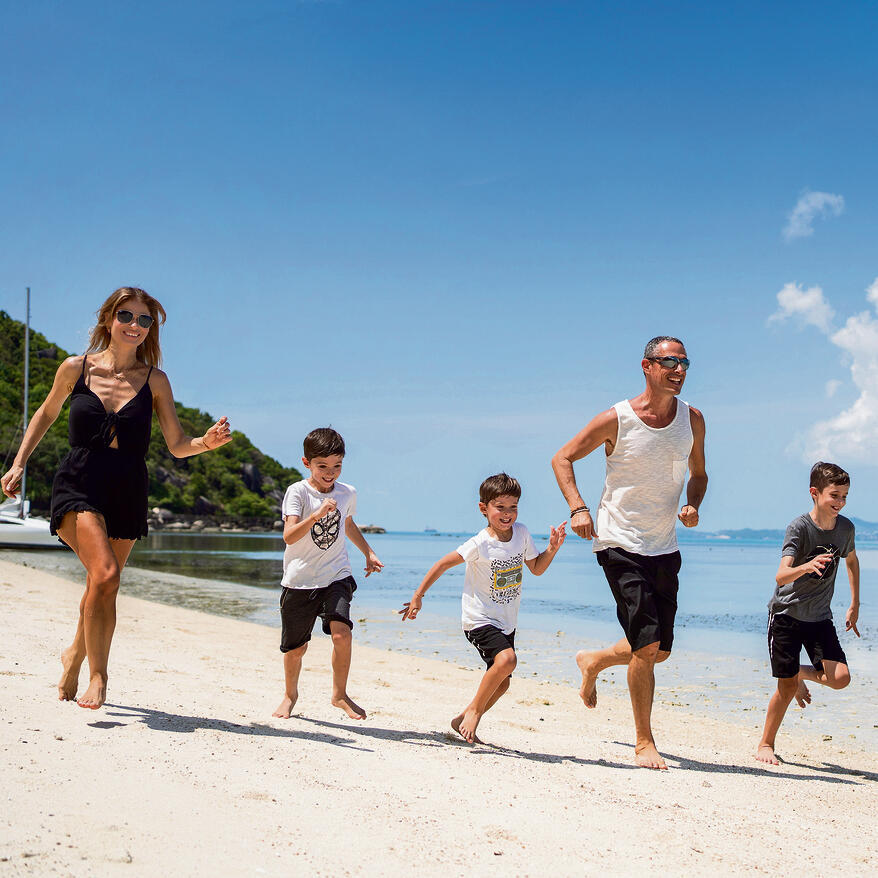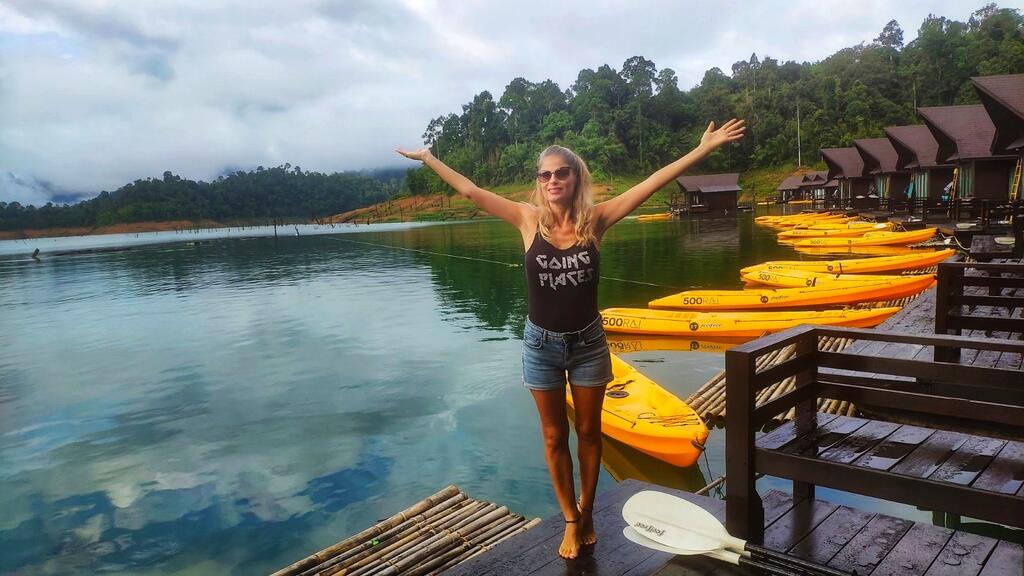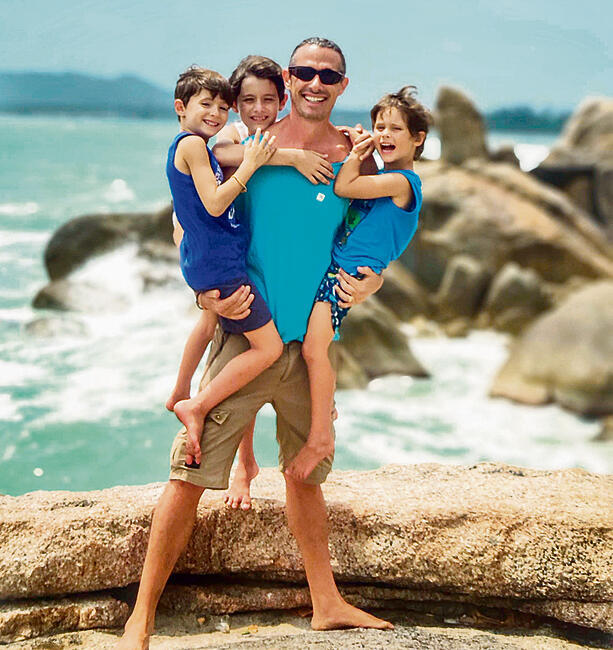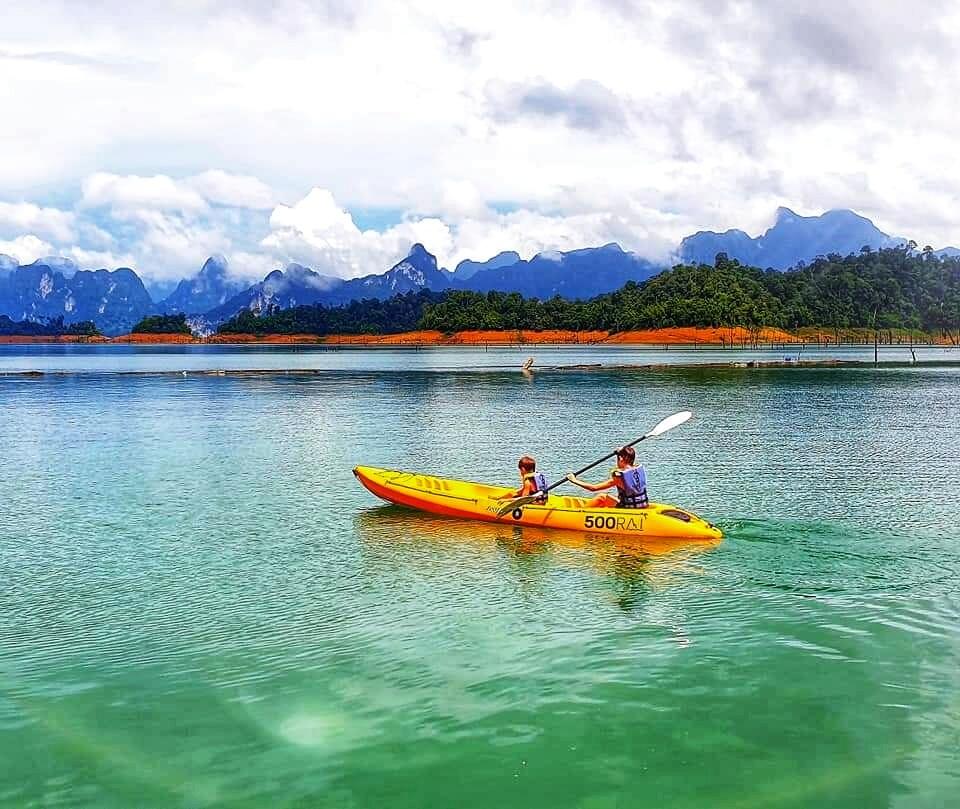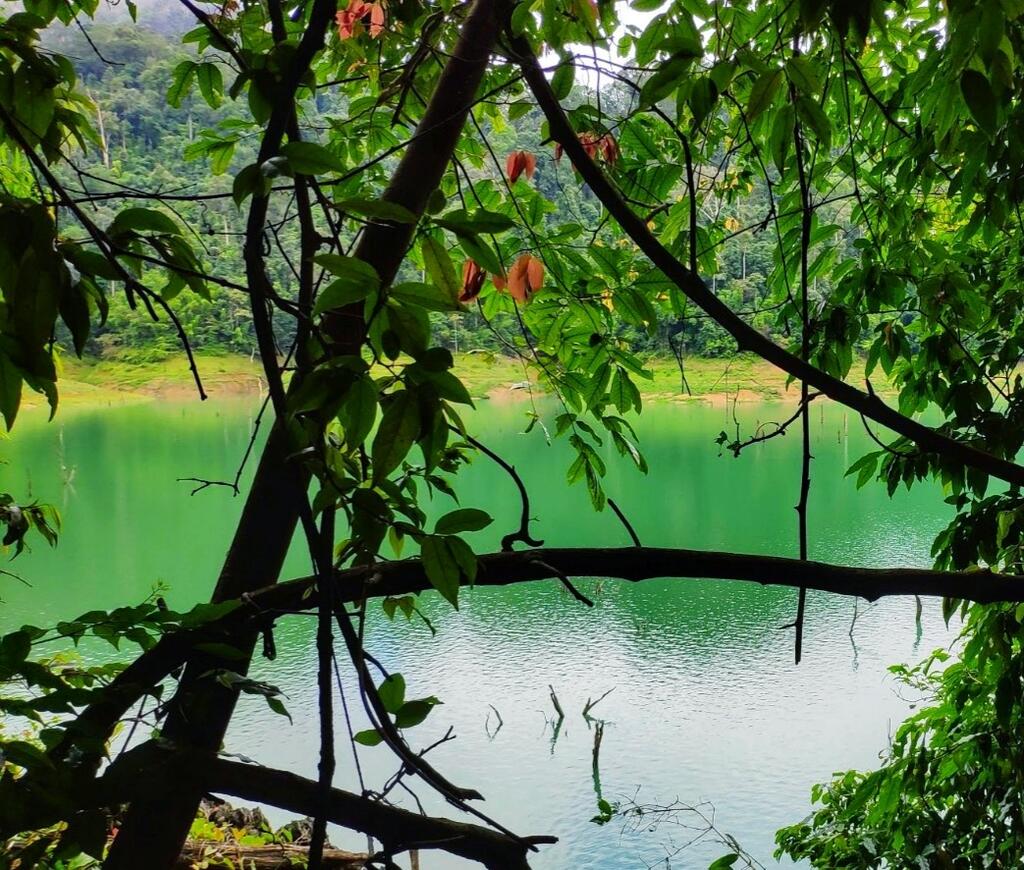“Come here! Sit down! I have to show you the videos we took on the island,” say Arik and Efrat Rozental, better known as the Israeli family that got stuck on Thailand's Koh Phangan island.
Related stories:
Their adventures have reached almost every home in Israel. Now, in their rather empty, rented apartment in Givatayim, the whole family appears on the television screen, smiling in bathing suits, and surrounded by coconut trees, golden beaches, azure sea – everything you might imagine on a postcard of a tropical island paradise.
We meet them here in Israel on a year-long hiatus. The family returned from Thailand for Passover 2022 while Efrat was pregnant. Their daughter, Naya, was born over four months ago and, in a few weeks’ time, they plan to head out, back to their nomadic family life – this time with a baby.
So, before they again pack their bags, they tell us how it all began, how they support themselves, how they organize the children when they have no structure, what their next destinations are and how various governments want them to visit their countries to promote tourism.
“A few years before COVID, I realized that I was not living right. I started asking myself questions about the purpose of life. We get up every day to the same routine. It wasn’t a fatalistic kind of thing. It was about where it could lead us,“ Arik Rozental says. “I had a great life. I’d walk to work. I was close to my work and near my children. So what was missing? “
“I didn’t want to go traveling at all,” says Efrat Rozental. “When Arik started talking about his dream of traveling, I told him that I was living my dream right here in Israel. We have a wonderful family, a great neighborhood, a park, good schools, good jobs – I’m a human resources manager for a big insurance company and Arik works in the media. I felt satisfied and appreciated. I didn’t imagine leaving it all.”
Arik: “But every day looks like the day before. Year after year, I was living in a loop, mainly around work. I hardly got to see the children.”
Efrat: “I remember eating with the computer in front of me. I’d be running from work to the kindergarten, coming home and carrying on working. One year after the other. And then I had to start taking care of my parents in the hospital.”
Arik: “People say how fast time goes by. It’s not time that goes by, it’s life that goes by. I remember the moment I stopped and realized that there could be a terrorist attack tomorrow, or someone might die of an illness, and what had I done apart from chasing my own tail?”
Arik finally arrived at the conclusion that he couldn’t carry on living like that. He told Efrat that he’d decided to get away from it all.
Efrat: “His idea seemed crazy. I was living in a rather conservative structure and I liked it. There was no way the children would miss a class or I’d miss a day’s work. I thought that his insanity would pass. But it didn’t; It just intensified. He wouldn’t stop talking about it. It was very hard at home. I just wanted to ignore it. I could always tell by the look on his face and the tone in his voice when he was going to try and sell me on the ‘Let’s get away from it all’ dream.”
Arik: “Each day I’d talk about it was one step closer to the dream.”
Efrat: “I thought it was terrible that you were going to break up the family, endanger us and do something so irresponsible. I started thinking about a solution.”
That he should go traveling on his own?
The two, in unison: “No.”
Arik: “The dream wasn’t to go traveling on my own, but with the family – to have experiences together.”
Efrat: “I thought an adventure lasting a month or two would be enough for him.”
Then Efrat lost her mother who had been battling cancer for seven years. Soon after, Arik’s parents also died of cancer. “Within four years, we’d lost everyone, and I started thinking about what Arik had been saying – that we never know what’ll happen tomorrow. We tend to think that we’ll get to do everything. But it’s not like that,” she says.
As if all these tragedies weren’t enough, after a long-awaited pregnancy, Efrat had a miscarriage. She also lost her voice for a few months.
“I couldn’t hold meetings with my team or have conversations with employees. I slowly realized that maybe Arik’s dream wasn’t so crazy after all," Efrat says. "I said to him: ‘OK. I’m coming with you to wherever you want to go.'”
Then the marathon began. They packed the few possessions they wanted to take with them. The rest they sold or gave to charity. They put a few boxes of books and albums into storage – and that was it. The Rozentals now had nothing left to keep from getting on a plane to follow Arik’s dream. When the couple eventually took the children out of school and kindergarten, Ofek was 10 years old, Liad was 5 ½-years-old and Or was 3 ½-years-old. Four months ago, Naya (which means prayer to God) joined the family.
So Arik's prayer came true.
Arik: “It was also Efrat’s prayer. She gave birth at the age of 44 ½. This was the beginning of the best time of our lives.”
"Another pregnancy was my dream. Looking back, I made it come true just because we went traveling. All the day-to-day stress in Israel dissolved and my body managed to hold a pregnancy to full term,” Efrat says in tears.
Living off NIS 3,000 a month
They set out in September 2019.
Efrat: “We got to Thailand and lived dirt cheap in a villa on a beach in a part of Koh Phangan that wasn’t on the tourist trail. It was in a resort with a pool and a breathtaking sea view. All for NIS 3,000 ($810) a month, including everything."
Six months later, COVID hit and they took the brave step of deciding to stay in Thailand. While the whole world was stuck indoors in the spring of 2020, Efrat and Arik were posting videos showing their family life on the tropical island.
"Efrat wrote about our experiences and there was a kind of magic to her words – the sort that changes people’s lives. People started writing to tell us that they had stopped everything and that the things she was posting had made them start thinking about their lives”
The videos went viral, garnering thousands of followers. They opened a Facebook page they called OLO - Only Live Once, which is also the initials of the children’s names – Naya was not yet born.
Efrat kept posting paradise videos that eventually caught the attention of Thailand’s tourism ministry. The ministry offered the family to serve as spokespersons for Thai tourism, showing the world that, while other countries were locked down, it was safe to travel in Thailand.
Their mission was so successful that the moment the skies opened, they were told, the number of Israeli tourists to Thailand was second only to that of the United States.
“It was insane. The world had shut down and the Thai ministry of tourism was sponsoring us to go to the very best resorts," Arik says. "Efrat wrote about our experiences and there was a kind of magic to her words – the sort that changes people’s lives. People started writing to tell us that they had stopped everything and that the things she was posting had made them start thinking about their lives.”
Efrat: “I didn’t want to even do it at the beginning and then it turned into a meaningful inner journey, touching very deep. I wrote with all my heart. I was very open. It became something much bigger than a family trip: We were far from home, surrounded by feelings that were strange to us. It peeled away our masks, allowing us to be the most open we could be. I was writing what it was hard for other people to say out loud.”
Arik: “We made people realize that they were 'organizing' their children rather than living them. They were investing their time in their careers, strangers and workplaces and were afraid to make their dreams come true. We made people understand that when something comes to you, it’s enough to physically move, or even just think about it, and it’ll help you create a different life. We showed how, during lockdown and the depression of COVID, we’d taken our lives to a totally different place, to a happy, peaceful tropical island.”
How did you support yourselves?
Efrat: “Arik worked remotely over the computer or by WhatsApp. As the whole world was on Zoom, it wasn’t so weird.”
Arik: “My greatest fears were about making a living. We can’t be not earning. I didn’t know if clients would carry on paying while I was traveling the world. I needed to think about bringing in new clients. But from the moment we set out, the office started taking off. Clients saw the courage, value and creativity and how we were pushing boundaries. And I say: This is how I dreamed it would be. Making my living on a magnificent beach. The children are with us. The office hours work out just right.“
Efrat: "When lunchtime comes in Thailand and we've already had half a day of peace, only then does the work day in Israel begin. Life is calm and good. We have nature all around us: coconut trees and banana fields and the glitter of the sea. It makes us a better couple and better parents. It makes us people who’ve found the simple life on some rural island with sand and sea and without malls or sidewalks.”
Arik: “We realized we had it all. All you need is to live a healthy life and be happy with your lot.”
Efrat: “I’m going through an inner journey with yoga and meditation. My writing lets me connect to myself and we’re all eating better and we’re more relaxed. I’m in a place where I’m happy with my life and with my family and I’m letting go to pursue the things I haven’t achieved.”
And then, when she lets go, Efrat’s greatest dream comes true and she gets pregnant and the family once again needs to think about temporarily returning to Israel.
They arrived last Passover for the pregnancy and birth. Little Naya is now sound asleep in an adjacent room and the older children are slowly returning from school. Arik takes a tray of Thai chocolate rolls out of the oven as Efrat chops fresh fruit.
"As soon as the skies opened, we saw a large Israeli community from our page make its way to Koh Phangan and Phuket, where we also lived for a while. We were then invited to go to Africa. We’re now thinking about it“
It’s not just videos of the family at the beach or in the pool or by the villa touching the oceanfront that drew in Internet users. It’s also Efrat’s very personal writing. She’s now collating everything she’s written into a book that she hopes to publish.
“We didn’t commercialize the blog. There are no advertisements or coupon codes. We also didn’t make any money out of it,” she tells us. “We answered all the questions we were asked – about how to do it, about the courage and fears, how to register children for school, how to get visas. As soon as the skies opened, we saw a large Israeli community from our page make its way to Koh Phangan and Phuket, where we also lived for a while. We were then invited to go to Africa. We’re now thinking about it.“
Living the good life
The Rozental’s journey, which has gone on now for three years, started in Chiang Mai and Pai in northern Thailand and the first part was spent acclimating themselves to living together as a family 24/7. They continued to Vietnam, where they spent a month and a half traveling from north to south, and then went back to Thailand.
“People are always talking to us about Third World countries, but we got to places where they had everything: fantastic scenery, great food, health care, peace and quiet,” Efrat says.
Once they were feeling good as a family, they began homeschooling.
Arik: “When we set off, Efrat said: ‘We’re going for three months, maybe six. There’s no way that Liad isn’t starting first grade.’ Ofek, who’s very serious said to me: ‘Dad, Liad has to start first grade.’ But after they started homeschooling, I asked Ofek, ‘Well, do you think that Liad needs to start first grade?’ He answered: ‘Yes, I just didn’t say in which country.'
"The children are really blossoming, and it’s all happening in Koh Phangan under the coconut trees"
“When they hear that a family’s going traveling, people imagine something hippy-dippy, something crazy and irresponsible, without focusing on education or any kind of routine. It’s not like that. We’ve developed a routine. We taught the children how to write letters and numbers in the sand on the beach.
During lockdown, children weren’t even going to school. Our children have been finishing their workbooks two years ahead of themselves. They’ve been learning English and about nature and economics and other countries and cultures. Ofek has been learning programming, video editing, coding and photography on YouTube. He now films and edits the videos we post.
Liad, who we were afraid wouldn’t start first grade, speaks English fluently and will enroll in an international British school using the Cambridge curriculum that includes ecology and environmental studies. The children are really blossoming, and it’s all happening in Koh Phangan under the coconut trees.
Our tens of thousands of followers see all of this. They also see that our lives are very organized, that we have good health care and private treatment if needed. When Liad broke his arm, for example, he needed an operation. Or when he injured his head, they flew us to Bangkok where he had a high-quality operation.“
But you need a lot of money for that. That’s health care for the rich.
Arik: “That’s not true. Not during COVID anyway. That’s what we always hear.“
Efrat: “If anything, you need a lot of money to live in Israel. We thought we’d only meet high-tech people working remotely, but we found digital nomads who are authors, photographers, psychologists, marketing managers, therapists, human resources managers, educational advisers. They all fled to work remotely.“
6 View gallery
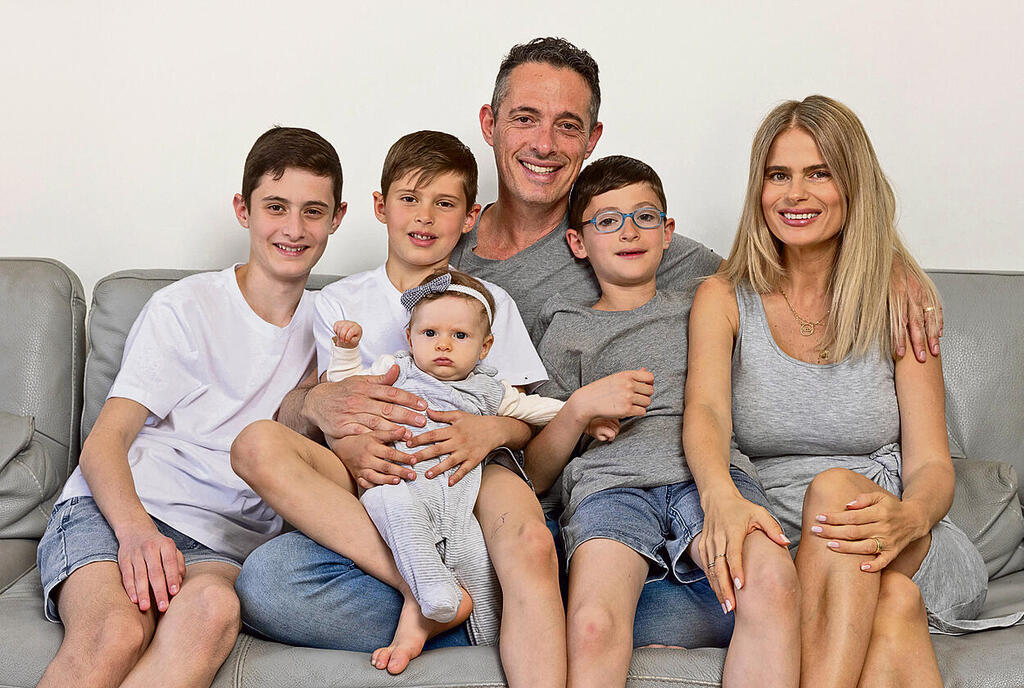

Arik and Efrat Rozental and their children at home in Israel
(Photo: OLO - Only Live Once)
Ofek enters the living room and I ask him if he enjoys traveling. “Very much,” he answers. “I know that Mom and Dad want me to do bagrut (high school matriculation) in Israel. The army too, obviously. So I want to carry on with this experience as long as I can.”
Do you miss your friends in Israel?
“Yes. And I hope we keep in touch. But I really want to go traveling again.”
You’re now writing a book about it and Arik’s giving lectures
Arik: “When we returned to Israel, I posted that I’d be giving talks about our journey, and that it would cost 70 shekels per person. The 300-seat auditorium sold out in two hours. The following date sold out too. I’ve so far given 8-9 talks. I only stopped when Efrat was about to give birth.”
He has another trick up his sleeve – a mentoring course for managers. He now owns and manages a company providing media consultancy, strategy and public relations.
Arik: “Efrat and I have taken on the thing called ‘change management’ and realized that making changes in life is a complete system that needs to be fully researched. People are afraid of change and prefer staying in a place that’s not good for them because it's familiar. I can take anyone and see them through change. I now understand change and how to manage it.”
That’s not to say that they don’t have reservations about their next journey. They’re still not sure where they’re going.
“Of course, we have our fears, even more than before. We’re now with a baby and a teenager. The question is what we do with our fears,” Arik says.
“It’s not that I’m not afraid. I’m still afraid that something with happen to us, but I’m more afraid that nothing will ever happen to us,” Efrat adds.


